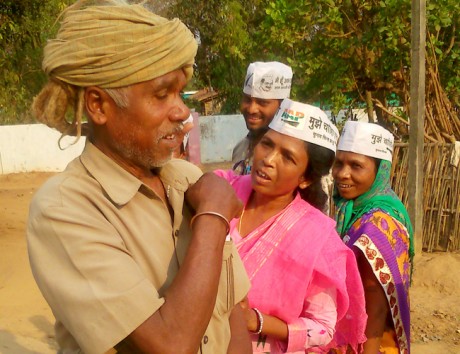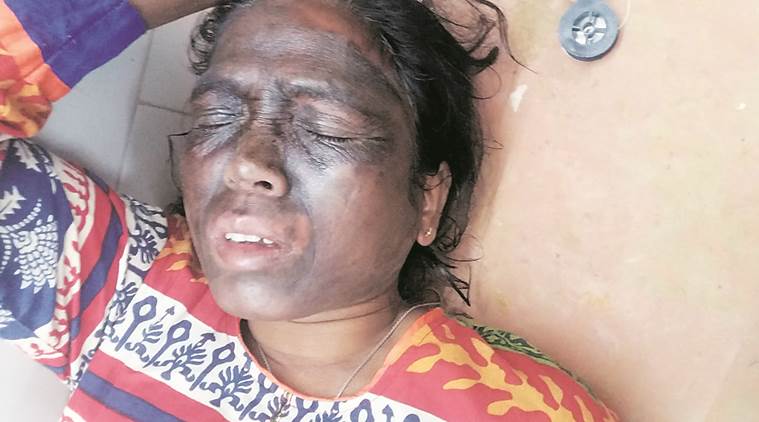A Koya Tribal from Dantewada region in Bastar, Chhattisgarh, Soni Sori was born to a family of administrators and politicians. Sori became a school teacher in Jabeli, Dantewada and taught at a government school for tribal children. Happy with her teaching, when she refused to become an informant for the Police, she was jailed on charges of colluding with Maoists. She was arrested in Delhi by the Chhattisgarh Police and later named in six more charges, including criminal conspiracy, extortion, attack on a police station. She was acquitted in six of the eight cases eventually, but the exploitation and abuse she faced during her wrongful and prolonged incarceration turned her into an Adivasi activist and a human rights defender.
Since the 1980s, Chhattisgarh (then part of the undivided Madhya Pradesh) has been the base of operations of India’s Maoist insurgency. Constitutionally declared under the Schedule V Areas, the region of south Bastar overlaps with the ‘Maoist or Naxal affected’ areas. Intended to strengthen self-governance of Adivasi communities, the safeguards of Schedule V fell after Chhattisgarh became a full state. Intense resource grab and land alienation of Adivasis remains the paramount reason for the state’s socio-political turmoil. Maoist insurgency and counter-insurgency by the state against the Maoists leave many Adivasis becoming the targets of state oppression. Soni Sori is one of those typical cases of a tribal woman getting caught in the crossfire between the security forces and the Maoists.
During her time in a Dantewada jail between 2011 and 2013, she alleged grave tortures committed on her by the jail authorities including sexual assault, physical abuse and mental harassment. In the jail, she was given electric shocks, stones were shoved in her vagina and anus, and she was stripped naked and sexually assaulted several times, she revealed. Her gynaecological examination disclosed that two stones were found in her vagina and rectum. These assaults, she asserts time and again, are quite common in Indian prisons.
On several accounts, Sori has recounted the conversation she had with these women when she asked them what they would do after their jail term ends. She says, the women told her if they survived the jails, they would not go back to their villages but run away and join the Naxals because who will marry them with these bodies. This is how the state creates Naxals, explained Sori. She goes on to say that it’s not accurate when the state says that the Naxals forcibly recruit people. Instead the government prepares Naxals by putting them through this abuse in jails. Prolonged prosecution and detention leads to these Adivasis losing their families, their land and property. Resonating the voice of the larger Adivasi rights activism, she stated that the aggression that the state displays in the name of combating the Naxals is an excuse to eliminate and evict Adivasis who live on these lands, forests, rivers.

A long time Tribal activist and now a politician, Sori joined the Aam Aadmi Party in 2014 that gave her a ticket to contest from Bastar constituency. She lost that election but continues to be a member of the party, working from Bastar. She continues to fight for justice and rights of the Adivasis, sustaining her social activities under the threat of arbitrary prosecution and fears of extra-judicial execution. She maintains that she is not an ally of the Naxals but neither is she with the state functionaries and their high-handedness. Rather, she stands for the tribals who regularly bear the brunt of this conflict and get oppressed for the crimes committed by insurgents. Describing their scheme of operation, she says the police attacks activists to weed out any element that tries to expose their excesses and impede their indiscriminate exploitation of the villagers.

Once she intensified her activism after her bail in 2013, so did her targeting by the Chhattisgarh state and police. False implications and charges by the police, slander campaign and orchestrated attacks made by faceless people followed her consistently. In February 2016, a chemical substance was thrown at her face by unidentified men on a motorcycle in Chhattisgarh. The attackers warned her that a similar attack will be made on her daughter if she didn’t stop working on the Mardum fake encounter case of Hidma, another female tribal victim of police violence.
Her family members were also subjected to arbitrary detainments, intimidation, harassment and verbal and physical abuse by the police as consequences for Sori’s work. It is believed that Soni had links with the insurgents but she wasn’t one of them. Educated tribal leaders and activists working for their welfare are often approached by Maoists for support and alliance. And even though her arrests were made under charges of links with them, Maoists had their own vendetta against her. In 2012, it was found that Maoists had issued a diktat forbidding her relatives from cultivating land for three years and in the previous year some Maoists had shot her father in the leg at his home.
When she was in jail, so was her husband Anil Futane, over charges of supporting Maoists. He had also faced extreme tortures in prison. Sori recalled with pain that after pressure from activists in Delhi, the jail authorities allowed her to attend the thirteenth day rituals of her dead husband who had undergone a prolonged sentence in Dantewada jail.
Various international activists and human rights organisations including Indian ones petitioned for her release and campaigned against her custodial tortures. Amnesty International declared her a prisoner of conscience for fighting against human rights violations by both Naxal rebels and Indian state forces. In 2018, she was conferred with the Front Line Defenders Award for her work in Bastar region.
Sori was living with her husband and their three children in Sameli Village before 2011 when she had to flee to Delhi fearing her encounter by the IG Kalluri- who had been accused of ordering the burning of 300 houses in Tadmetla, Timmapuram and Morpalli, in 2011, of which Sori and her nephew had documentary evidence. Gradually, she found herself in company of lawyers, politicians, activists but not so much her own family. This alienation brought her closer to the issues of tribals, tribal women and tribal children, Maoist and non-Maoist alike. Whether or not she is a Maoist sympathiser- a category that has been shaped by the state’s own brutal militarisation of tribal lives- she is the tribal woman that is vulnerable to state oppression and also champions the threat to it.
On September 24, she was summoned by the National Investigation Agency (NIA) for questioning in connection with the killing of Bheema Mandavi, a Bharatiya Janata Party MLA, and four policemen in an alleged Naxal attack from last year. Her appearance was made mandatory despite the fact that she had contracted Covid infection. Sori said she was asked to make arrangements herself and be present at NIA’s Dantewada office. She was under high fever while she was questioned for seven hours. After verifying twice that she is Covid positive, she was sent back with charges under sections 188, 269, and 270 of the Indian Penal Code for disobeying an order duly promulgated by a public servant, for indulging in negligence and malignancy likely to spread infection or disease which is dangerous to life.
